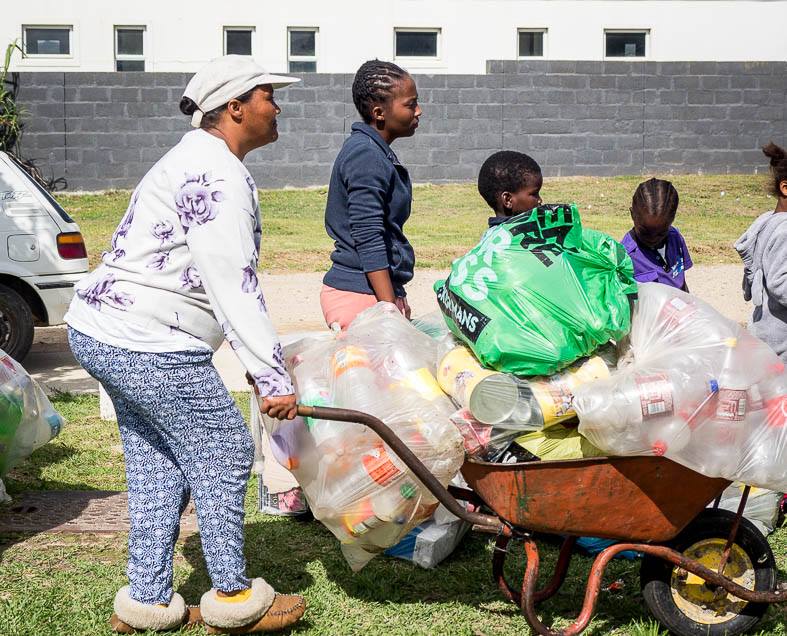Under the auspices of Stanford Conservation, the Stanford Community Recycling project (SCORE) has become known as the Stanford Swop Shop. It seeks to promote recycling and consequently reduce solid waste by giving Stanford’s disadvantaged and economically challenged residents the opportunity to exchange recyclable plastic, glass, tins and some paper for tokens which can be used to ‘purchase goods from the Swop Shop. The goods consist of school stationery, reading books, toys, second-hand clothing, household linen and goods, shoes, toiletry items including sanitary pads (both disposable and washable, re-usable). One of the aims is to instill an ethic of having to ‘work’ to be able to ‘buy’ what you need – no free handouts.
The Swop Shop is open twice a month at the Stanford Community Hall precinct. All items in the shop are donated, and everyone ‘manning’ the shop does this on a voluntary basis. Regular fundraising and donations allow the team to purchase the items available in the Swop Shop.
LOCATION / AREA
The Stanford Swop Shop is located on the Stanford Community Hall precinct in Bezuidenhout Street. The shop operates from a 12m container purchased from funds raised and a 3m storage container which was donated by Nedbank.
BENEFICIARIES
The low income residents of Stanford South, Tembelihle and Die Kop are the beneficiaries. They are able to “purchase” necessary school and personal items by means of personal effort (collecting recyclable items) in order to supplement their income to put food on the table.
The introduction of sanitary pads is an additional aim to enable the disadvantaged female youth to regularly attend school and receive the education they are entitled to.
MOTIVATION
About 60% of Stanford’s residents are economically challenged and more often than not have to forfeit human dignity (toothpaste, sanitary pads etc) in order to buy food for the table. The same applies to items that stimulate children mentally and physically – such as reading books, balls etc. The Swop Shop gives residents the opportunity to access these types of goods and hence improve their human dignity and scholastic development.
The Municipality, on the other hand, benefits in that they do not have to collect recyclable material and only assist 2 hours a day every second week to collect all the recyclables brought to the Swop Shop. The municipality further benefits from the project as promoting recycling reduces the volume of waste brought to the landfill site, extending the life span thereof and the subsequent capital cost of having to build a new landfill site.
IMPACT
The Swop Shop hopes to educate as many of the local population as possible in the importance of keeping their environment clean, as well as the health hazards to which their families are exposed because of diseases proliferating in garbage. It will be measured by noticing the difference in the cleanliness of the streets, getting feedback from the municipal refuse collection staff on the volumes of recyclables which are collected without them having to employ more labour. It is hoped that with constant educational talks and the very act of collecting the items will instill in the residents who attend the Swop Shop the importance of not littering, i.e. throwing down the goods in the first place.
The RECYCLING project therefore reduces SOLID WASTE by cleaning up the ENVIRONMENT and stimulates SOCIAL DEVELOPMENT by focusing on the most marginalised communities in the Overstrand area.
COMMENCEMENT
This project has been running since 2014 and used to operate under the wings of Stanford Rotary. However, in August 2016, Stanford Rotary requested the Stanford Conservation Trust to take Swop Shop on as a project as the point of departure is a cleaner environment. Since then Swop Shop is officially a Stanford Conservation project and has become known as the Stanford Swop Shop.
The project is ongoing as long as the team can keep it sustainable. This is made possible with help from the local community who donate most of the items for sale in the swop shop, except for most of the stationery and toiletries for which funding is sought. The main focus is to provide school stationary in order to improve school performance.
Unfortunately the school performance of disadvantaged girls is severely hampered because of the female biological cycle. As they do not have the money to purchase sanitary pads, they stay at home and lose a week’s school work. At present a donation to purchase sanitary wear for school girls has been received, which should last until the July 2018. A program is being workshopped, with the assistance of the local clinic and Swop Shop team members, in the local schools at present and should result in providing numbers of girls who need monthly assistance. Education regarding using washable and/or re-usable sanitary wear is part of the programme. Basic toiletries such as soap, toothpaste and deodorant are also in great demand.
Grant-in-Aid funding will enable the project to continue the good work to date, keep the environment clean, allow the youth to improve school performance and assist the municipality in postponing the development of new landfill site and reducing sewerage blockages because of the (monthly) rags flushed down the sewerage system.
FINANCES
Thank you to regular donors Rotary, individual villagers and to the Overstrand Municipality for the Grant-in-Aid for helping to keep the finances in a healthy state. Monies from the Junktique market are also providing for essential items.
As Stanford does not have major businesses which can be approached for funding, the Swop Shop heavily relies on the goodwill of the more affluent Stanford residents, as well as their family and friends.
The New Weighing Station is at Ou Krale next to Die Stoor’s yard at the Community Hall. This was opened on Monday 14 May 2018 with many members of the local community waiting patiently with their bags of recycling. Volunteers were on hand to smooth the process and run the shop.

